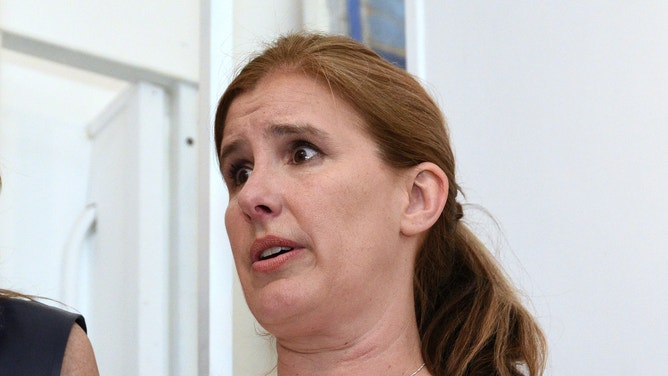We support our Publishers and Content Creators. You can view this story on their website by CLICKING HERE.
Well, well, well. From the “who could have ever seen this coming” department, OutKick presents a story that shows that one of the U.S.’s foremost supporters of so-called gender-affirming care has been withholding the results of a study that likely doesn’t fit their preferred narrative.
According to an article from the New York Times, a doctor named Johanna Olson-Kennedy – who is one of the most ardent supporters of allowing children to take life-altering drugs to “change” their gender – found that puberty-blockers don’t actually improve the mental health of “transgender youth.”
Who would have ever thought that? Well, if you read OutKick, you’ll know that this is something we have written about many times.
Unsurprisingly, Dr. Olson-Kennedy is based in California and works at the Children’s Hospital of Los Angeles.
“The leader of the long-running study said that the [puberty-blocking] drugs did not improve mental health in children with gender distress and that the finding might be weaponized by opponents of the care,” the Times description of the article reads.
Yes, how dare people use the results of a scientific study to make future decisions about medicine? Monsters, we are!

Dr. Johanna Olson-Kennedy tried to hide the results of a study which showed that puberty-blockers don’t improve mental health among adolescents.
(Michael Tullberg/Getty Images)
“Puberty blockers did not lead to mental health improvements, [Olson-Kennedy] said, most likely because the children were already doing well when the study began,” the article says.
But, and I will give credit to the New York Times here, this sentence comes almost immediately after:
“That conclusion seemed to contradict an earlier description of the group, in which Dr. Olson-Kennedy and her colleagues noted that one quarter of the adolescents were depressed or suicidal before treatment.”
So, when the study began, Olson-Kennedy said the kids were depressed and suicidal, but now she says they weren’t. After the results went against her, she changed her tune and said the drugs worked. This seems like the opposite of science, but what would I know?
I’m obligated to point out here that I do not have a medical degree like the esteemed Dr. Olson-Kennedy.
Always follow the science… unless the science disagrees with the prevailing narrative
“In the nine years since the study was funded by the National Institutes of Health… Dr. Olson-Kennedy’s team has not published the data. Asked why, she said the findings might fuel the kind of political attacks that have led to bans of the youth gender treatments in more than 20 states, one of which will soon be considered by the Supreme Court,” the article continues.
Ah, yes. The COVID rules. Follow the science, unless the science doesn’t say what you want it to say. Then, hide it and hope no one finds out.

A “New York Times” article shows that a well-known “gender-affirming care” doctor tried to hide the results of a study which showed that puberty-blockers don’t improve mental health among adolescents.
(Stock Photo – Getty Images)
More credit to the New York Times (I never thought I would write that sentence) for poking holes in another inaccurate claim that Olson-Kennedy tried to make.
“She said that she intends to publish the data, but that the team had also been delayed because the N.I.H. had cut some of the project’s funding. She attributed that cut, too, to politics, which the N.I.H. denied. (The broader project has received $9.7 million in government support to date.)”
So, $10 million isn’t enough money to tell us that blocking puberty – which, last I checked, was pretty important for teenagers, although again I’m not a doctor – is bad for kids?
I could have told you that for a lot less. But have I mentioned I’m not a doctor?
Here’s where I am going to criticize the New York Times, which you knew had to come at some point.
They decided to get an “opposing” view, which is admirable. Except one of the NYT’s dissenting voices wasn’t really all that dissenting.
“‘I understand the fear about it being weaponized, but it’s really important to get the science out there,’ said Amy Tishelman, a clinical and research psychologist at Boston College who was one of the study’s original researchers.”
So the “opposing” view, which says – shocker – that people deserve to know the results, also comes from someone who was part of the study. Lest you think this was an opposing physician invited to take part, Tishelman clears up her perspective for us.
“Dr. Tishelman also noted that, even if the drugs did not lead to psychological improvements, they may have prevented some of the children from getting worse,” the next line of the piece reads.
More good science here. The drugs “may have” made some kids not get “worse.”

A “New York Times” article shows that a well-known “gender-affirming care” doctor tried to hide the results of a study which showed that puberty-blockers don’t improve mental health among adolescents.Photo by Jakub Porzycki/NurPhoto)
(Jakub Porzycki/NurPhoto via Getty Images)
My biggest question is this: did they use a control group of confused kids but instead of giving them life-altering drugs, they were instead sent outside to exercise, limited in their time on social media and fed a healthy diet?
That’s the study I’d like to see. But, of course not. The first course of action is always right to pharmaceutical intervention.
Playing outside, limiting screen time and eating healthily just doesn’t generate as much revenue as medicine, you know.
Dr. Johanna Olson-Kennedy’s study on puberty blockers isn’t the first one to conclude that the drugs don’t help mental illness among confused children.
It turns out, interestingly enough, that the United States isn’t the first country to try and hide the results of a potentially influential study that might have put an end to this nonsense.
The Times pointed out that this happened in England, too. And before we get to that, we must note that the only reason puberty-blocking medication became the standard for treating “gender dysphoria” was one study done in the Netherlands in 2011.
“England’s youth gender clinic in 2011 tried to replicate the Dutch results with a study of 44 children. But at a conference five years later, the British researchers reported that puberty blockers had not changed volunteers’ well-being, including rates of self-harm,” the article says.
“Those results were not made public until 2020, years after puberty blockers had become the standard treatment for children with gender dysphoria in England.”
So, let me get this straight.
One study from 2011 was enough to make puberty-blocking drugs the gold standard “treatment,” but now that two studies done in TWO DIFFERENT countries have shown the exact opposite, we aren’t prepared to make changes to the original protocol?
And both of those new studies attempted to hide their data so as not to stop teenagers from being given life-altering medication?
As Dr. Hillary Cass, a pediatrician who did a review of youth gender services in England, told the Times, “It’s really important we get results out there so we understand whether it’s helpful or not, and for whom.”
I may not be as smart as these doctors, but this sure as hell seems to me like a scandal of epic proportions that hurt thousands, possibly millions, of children across the globe.
Then again, I’m not a doctor.

 Conservative
Conservative  Search
Search Trending
Trending Current News
Current News 





